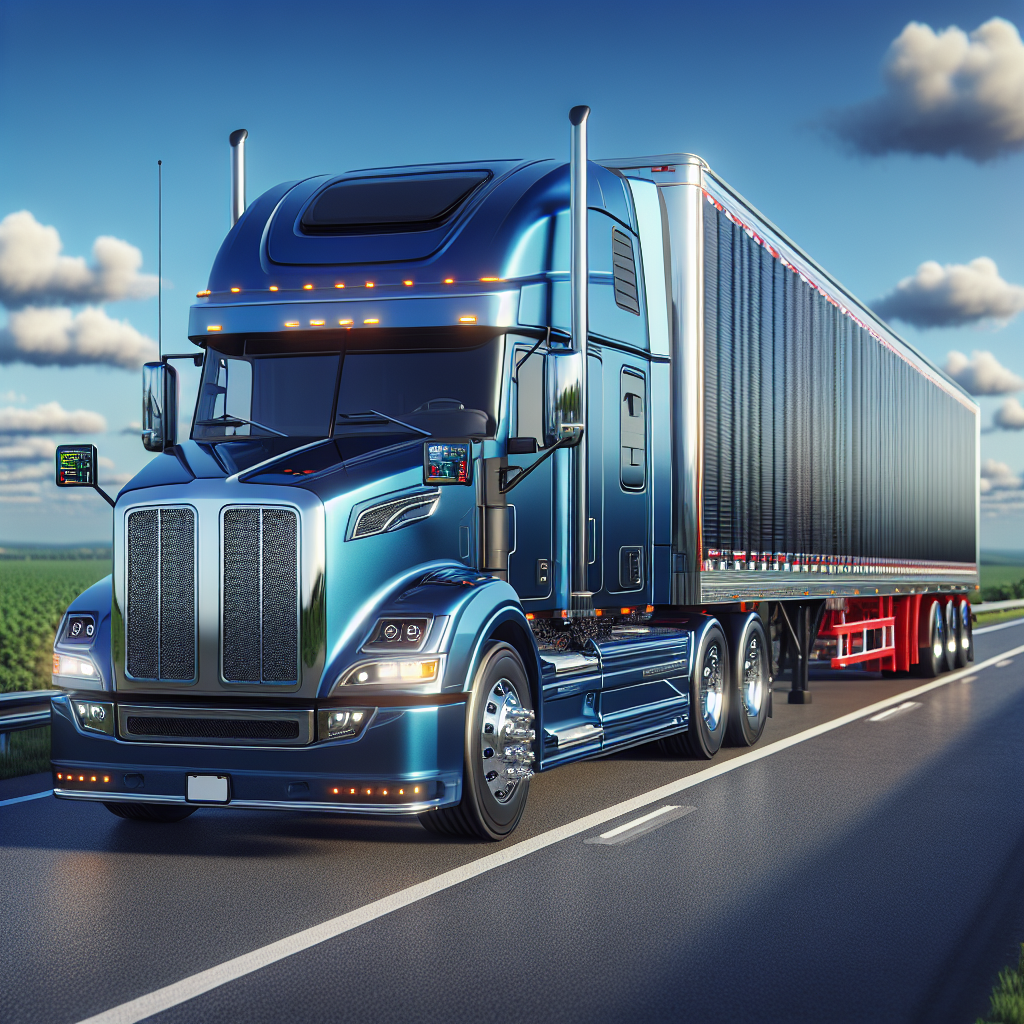Maintaining optimal tire pressure is crucial for both performance and safety when it comes to trucks and trailers. An effective tire pressure monitoring system (TPMS) serves as an essential tool in achieving this goal. By continuously monitoring tire pressure, the TPMS alerts drivers to any significant deviations from the ideal pressure range, which can prevent potential hazards on the road.
When tire pressure is too low, it can lead to increased tire wear, reduced fuel efficiency, and compromised handling. On the other hand, over-inflated tires can also be dangerous, leading to a higher risk of blowouts. Here are some key benefits of having a robust TPMS:
- Enhanced Safety: Keeping tires properly inflated reduces the likelihood of accidents caused by tire failures.
- Improved Fuel Efficiency: Correct tire pressure results in better fuel economy, saving costs in the long run.
- Extended Tire Life: Regular monitoring helps prevent uneven wear and prolongs the lifespan of your tires.
- Real-Time Alerts: Immediate notifications allow drivers to take prompt action when tire pressure issues arise.
Given these advantages, it's crucial to invest in a quality tire pressure monitoring system for your truck and trailer. By doing so, you not only enhance your safety but also ensure the longevity of your vehicle's tires. Tow with peace of mind, knowing that trailerwatchdog is standing guard.
How Tire Pressure Affects Truck Performance

The performance of a truck is significantly influenced by tire pressure. Properly inflated tires play a vital role in ensuring that the vehicle operates at its best. When tire pressure is within the recommended range, the truck benefits from optimal traction, handling, and overall performance. Conversely, both under-inflation and over-inflation can lead to various performance issues.
Here are some ways tire pressure affects truck performance:
- Traction: Proper tire pressure ensures that the contact patch—the area of the tire that touches the road—is maximized. This enhances grip and traction, especially in adverse weather conditions. Insufficient pressure can lead to slippage, while excessive pressure can reduce the tire's ability to conform to the road surface.
- Fuel Efficiency: Under-inflated tires create more rolling resistance, resulting in increased fuel consumption. A properly functioning tire pressure monitoring system helps maintain optimal pressure, contributing to better fuel economy.
- Handling and Stability: Tire pressure directly affects a truck's handling characteristics. Correct pressure ensures stability during cornering and braking, while incorrect pressure can lead to unpredictable handling.
- Tire Wear: Maintaining the right tire pressure promotes even wear across the tread, extending the life of the tires. This not only saves money but also enhances safety by preventing blowouts.
In summary, tire pressure is a critical factor in the overall performance of a truck. Regularly checking and maintaining optimal tire pressure can lead to significant improvements in safety and efficiency on the road.
Choosing the Right Monitoring System for Trailers

When it comes to ensuring the safety and efficiency of your trailer, selecting the right tire pressure monitoring system is crucial. A suitable monitoring system not only provides real-time data but also enhances your ability to prevent potential failures. Here are some key considerations to keep in mind when choosing a monitoring system for your trailer:
- Compatibility: Ensure that the monitoring system is compatible with your specific trailer type and tire sizes. Different trailers have varying requirements, so a one-size-fits-all approach may not be effective.
- Real-Time Monitoring: Look for systems that offer real-time data transmission. This feature allows you to receive instant alerts on tire pressure and temperature changes, enabling you to take action before issues escalate.
- Range of Features: Opt for a system that provides comprehensive features, such as axle temperature monitoring, tire pressure alerts, and historical data tracking. These features can help you make informed decisions about maintenance and usage.
- Ease of Installation: Choose a monitoring system that is easy to install and use. Complex installations can lead to operational issues, while a user-friendly interface can enhance your overall experience.
- Durability and Reliability: The monitoring system should be built to withstand harsh environmental conditions. Look for systems that are weatherproof and designed for long-term use.
By carefully evaluating these aspects, you can select a tire pressure monitoring system that not only meets your trailer's needs but also contributes to safer and more efficient towing experiences.
Best Practices for Maintaining Tire Pressure

Maintaining optimal tire pressure is essential for the longevity of your tires and the overall safety of your trailer. Following best practices can help ensure that your tires are always in top condition. Here are some effective strategies to keep in mind:
- Regular Checks: Schedule routine checks of your tire pressure, ideally before every trip. Use a reliable tire pressure gauge to measure the pressure when the tires are cold, as heat from driving can lead to inaccurate readings.
- Know Your Specifications: Familiarize yourself with the manufacturer's recommended tire pressure for your trailer. This information can typically be found in the owner’s manual or on a sticker located on the trailer itself.
- Monitor Temperature: Keep an eye on tire temperature, as extreme heat can indicate under-inflation or other issues. A tire pressure monitoring system can provide real-time temperature data, allowing you to address any problems promptly.
- Inspect for Damage: Regularly inspect your tires for signs of wear, damage, or punctures. Early detection of issues can help you avoid blowouts and other dangerous situations on the road.
- Adjust for Load: When hauling heavy loads, consider adjusting your tire pressure according to weight. Overloaded tires can lead to increased wear and may even fail on the road.
By adhering to these best practices, you can maintain optimal tire pressure and ensure a safer towing experience for you and your cargo.
Advanced Features of Modern Monitoring Systems
Modern tire pressure monitoring systems (TPMS) for trucks and trailers have evolved significantly, incorporating advanced features that enhance safety and efficiency. These innovations not only provide real-time data but also help in preventing potential issues before they escalate. Here are some key features that make contemporary monitoring systems indispensable:
- Real-Time Monitoring: Advanced TPMS solutions offer real-time tire pressure and temperature monitoring, allowing you to receive instant alerts when abnormalities occur. This feature is crucial for maintaining optimal performance and safety.
- Remote Access: Many modern systems enable remote monitoring via mobile apps. This allows drivers and fleet managers to check tire status from anywhere, providing peace of mind during long hauls.
- Data Logging: The ability to log tire pressure data over time can help identify trends and potential problems. With data logging, users can analyze patterns that may indicate recurring issues, leading to more informed maintenance decisions.
- Integration with Fleet Management Systems: Advanced TPMS can integrate seamlessly with existing fleet management software, providing comprehensive insights into vehicle performance and maintenance needs. This integration helps in optimizing overall fleet efficiency.
- Alerts and Notifications: Customizable alerts can be set up to notify users of critical changes in tire pressure or temperature. These notifications allow for immediate action, reducing the risk of accidents caused by tire failure.
With these advanced features, modern tire pressure monitoring systems significantly enhance the safety and reliability of trailers on the road.
Integrating Monitoring Systems with Fleet Management

Integrating tire pressure monitoring systems (TPMS) with fleet management software is a game-changer for operators of trucks and trailers. This synergy not only streamlines operations but also enhances vehicle safety and efficiency. By connecting these systems, fleet managers can access a wealth of data that can inform maintenance decisions and operational strategies.
Here are some of the key benefits of integrating monitoring systems with fleet management:
- Centralized Data Access: Integration allows for all vehicle data, including tire pressure and temperature readings, to be consolidated in one platform. This means fleet managers can monitor tire health alongside other critical metrics such as fuel consumption and engine performance.
- Proactive Maintenance: With real-time access to tire data, fleet managers can implement proactive maintenance schedules. This approach minimizes unexpected breakdowns and extends the lifespan of tires, ultimately saving costs.
- Enhanced Safety: Monitoring systems provide alerts about tire issues, which can be immediately addressed. This proactive approach significantly reduces the chances of tire-related accidents, ensuring the safety of drivers and cargo.
- Improved Route Planning: By analyzing tire performance data, fleet managers can optimize routes based on tire wear and pressure, leading to better fuel efficiency and reduced operational costs.
- Real-Time Reporting: Integration allows for automatic reporting of tire conditions to fleet managers, enabling swift decision-making and timely interventions based on data-driven insights.
Incorporating tire pressure monitoring systems into your fleet management strategy is essential for achieving operational excellence. Tow with peace of mind, knowing that trailerwatchdog is standing guard.








